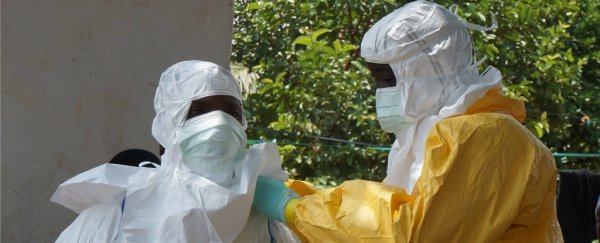It's tough for the doctors and medical staff working out in West Africa at the moment: just a few hours after the World Health Organisation declared the region Ebola-free, a new case was discovered in Sierra Leone, as the BBC reports. The death occurred earlier this week in the Tonkolili district of the country, and it's believed the individual involved had recently travelled from Kambia near to the border with Guinea.
While a disappointing development, it's not necessarily a surprising one. "Guinea, Liberia and Sierra Leone remain at high risk of additional small outbreaks of Ebola in the coming months due to the virus persisting in survivors after recovery," said a WHO statement. In other words, these kind of small-scale incidents are to be expected, and while still dangerous, can be contained.
"We are now at a critical period in the Ebola epidemic as we move from managing cases and patients to managing the residual risk of new infections," said Bruce Aylward, the WHO's Special Representative for the Ebola Response. "We still anticipate more flare-ups and must be prepared for them."
It was actually back in November that Ebola transmission in Sierra Leone specifically was declared to be over; however, the country is still in the special 90-day enhanced surveillance window, a period that's designed to catch any hidden transmissions and new flare-ups. Now one of those transmissions has come to light.
Health officials are now seeking to reach those with whom the patient might have come into contact, and this is a pattern we might have to live with for a while: consider Liberia, which has been declared Ebola-free twice since May 2015 only for new cases to come to light. More than 11,000 people have died from the disease in the West Africa region since the outbreak was first discovered in December 2013.
It's hoped that the frequency of these flare-ups will decrease in time and be short-lived when they do appear. In a statement released on Thursday, WHO Director-General Margaret Chan said that getting on top of the outbreak had been "a monumental achievement" by the agencies involved.
"So much was needed and so much was accomplished by national authorities, heroic health workers, civil society, local and international organisations and generous partners," she said. "But our work is not done and vigilance is necessary to prevent new outbreaks."
The worst Ebola epidemic in history, the outbreak that began in December 2013 in Guinea reached its peak in the late summer of 2014 as medical organisations struggled to get on top of the spread of the disease. The turning point came in the first months of 2015, and the number of cases has been steadily dropping ever since. However, as the latest case shows, the story isn't quite over yet.
